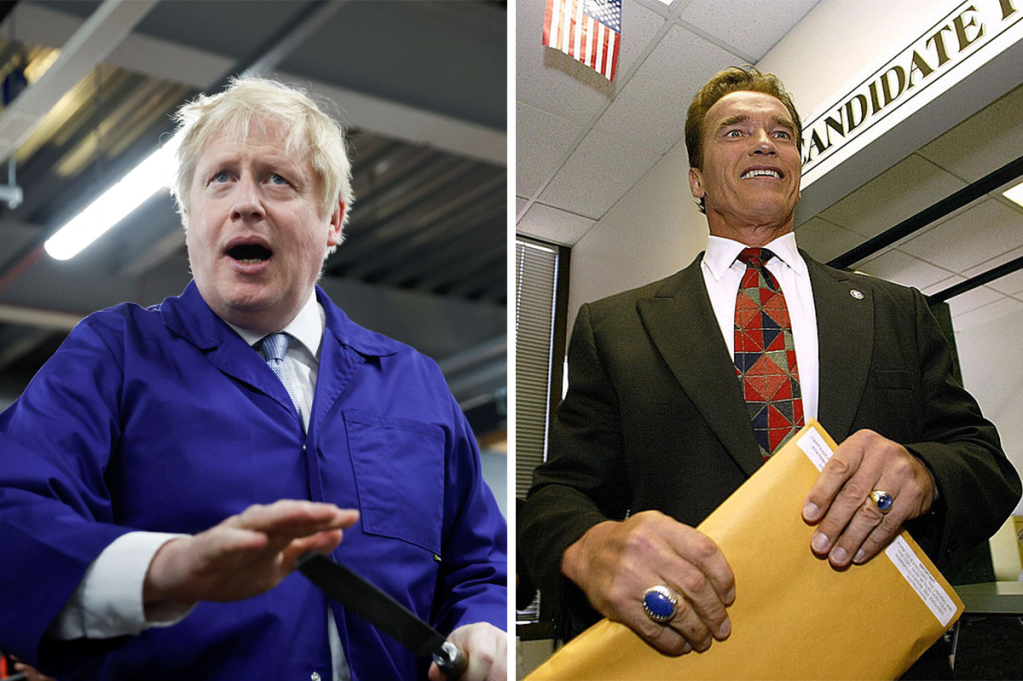As the political stage that Boris Johnson stands on continues to shrink and become more unstable, I am reminded of how much his career resembles that of another larger-than-life celebrity.
Last month, Arnold Schwarzenegger rolled his large black Yukon SUV over a red Prius in Los Angeles. The former California governor was uninjured, but the other driver suffered serious injuries and was hospitalized. Law enforcement sources told TMZ that “they believe the accident was Arnold’s fault.” They think Arnold made an illegal left turn at an intersection. There’s no word if he will be charged.
The incident got me to thinking how both Boris and Arnold have a history of ignoring rules and creating mayhem around them.
The parallels between Boris Johnson’s current difficulties and how Schwarzenegger’s governorship ended in ruins in 2011 haunt me. Both were brilliant men who many viewed as potential savior figures but wound up disappointing friends and supporters alike.
I extensively covered the California recall campaign for governor in 2003. In that race, Arnold leveraged his celebrity to upend the political world and replace a feckless, incompetent incumbent governor named Gray Davis. His feat resembled that of Boris’s Brexit blowout, after which he shoved aside the floundering Theresa May. Both men became political superheroes.
Arnold Schwarzenegger never compared himself to the Incredible Hulk the way Boris Johnson has. (“The madder Hulk gets, the stronger Hulk gets,” Johnson told the Daily Mail.) Instead, he was the Terminator, the similarly unstoppable colossus who would vanquish all his foes.
It didn’t turn out that way. Schwarzenegger started out strong — repealing an unpopular car tax and reforming the state’s business-crushing workmen’s compensation rules.
But within a few months he was sidetracked. He was urged by advisors to put a measure on the ballot reviving a dormant state law that limited how much state government could grow to increases in population and inflation. His wife, Maria Shriver, a liberal member of the Kennedy clan, successfully convinced him to negotiate with the liberal Democratic legislature instead.
When that failed Arnold took bad advice from a group of greedy consultants (nicknamed “the Staff Infection”) and overreacted to events. He put several controversial ballot measures to reform government on the November, 2005 ballot. But he underestimated the power of his opponents and had them considered in an off-year election where turnout would be low. Ultimately, all of his measures failed and his approval ratings skidded into the forties.
Facing re-election in less than a year, Arnold lurched left and hired a top liberal aide in Gray Davis’s failed administration, as his chief of staff. He threw his fellow Republicans in the legislature under the bus, proposed massive new spending programs and became an eco-warrior touting a plan to reduce California’s greenhouse gas emissions by 80 percent by the year 2050. The man who had once touted Milton Friedman as his economic “guru” proved to have principles that were skin-deep in a time of adversity.
“His number one goal was to not be seen as a failure,” former congressman Dana Rohrabacher, a friend of Schwarzenegger’s since the 1980s recalls. “Unfortunately, when all you want to do is to appear not to be a failure, you’re doomed to be a failure.” In summing up Arnold’s seven years in office, Los Angeles magazine concluded he ultimately was “a politician who often seemed in over his head, who prevaricated and bungled, switching sides as it suited him to save his political skin.”
Arnold did win re-election in 2006, but the state’s crushing debt, a housing bubble that burst and his constant policy zig-zags cratered his approval numbers. When he left office in 2010, he approval rating was barely above 20 percent. In retirement, is was soon learned that his constant affairs as a Hollywood actor had continued as a married man (including an illegitimate son fathered with his housekeeper), leading to the eventual breakup of his marriage in 2011.
One wouldn’t want to overdo the parallels between Arnold and Boris, but there are some. Boris shares with Arnold an apparent inability to realize how people will come to view his poor judgment and language.
An early sign came when as foreign secretary, Boris came under fire for recklessly allowing a US business to join trade missions he led and receive thousands of pounds in sponsorship grants. Then came the subterfuge with which Boris allowed private parties to pay for the remodeling of his No. 10 apartment. Just as Arnold was often unable to resist the advice or commandments of his liberal wife, Maria, Boris is constantly chided for being under the spell of his environmentalist wife, Carrie Symonds.
Dismissing the concerns of female Labour MPs who claimed they were being bullied and threatened over their stance on Brexit as “humbug” threatened to make Boris’s personality an issue for voters. The same thing happened in California, when in the midst of his initiative campaigns Arnold dismissed his opponents as “girly men.”
British Conservative Party members who gave Boris a landslide vote to make him their new prime minister had ample warning that they were electing a man with highly flexible principles. Recall that Boris famously told friends he only backed Brexit in 2016 after “veering all over the place like a shopping trolley.” After becoming PM, he told his Cabinet he was the most “liberal” Tory prime minister in decades, and compared himself to Michael Heseltine.
Boris is a gifted improviser and has gotten out of scrapes many times in the past. He may yet survive in office.
But his performance to date as prime minister — along with the failure of Arnold as California governor — should remind all of us of the dangers of putting too much faith in celebrity political saviors. Their very careers are often an exercise in putting their egos ahead of the interests of their fellow party colleagues. Not to mention the pursuit of sound, consistent policy solutions, which both men promised but only haphazardly pursued.

























